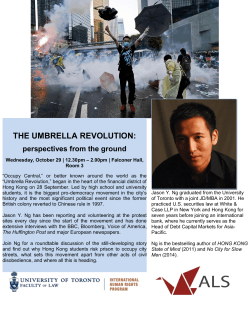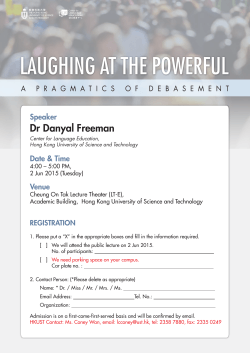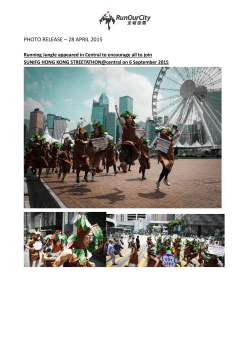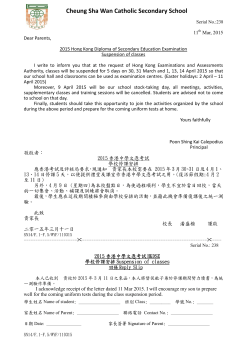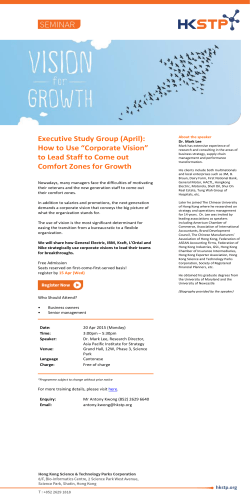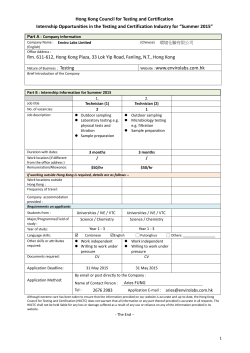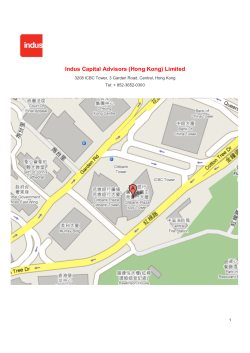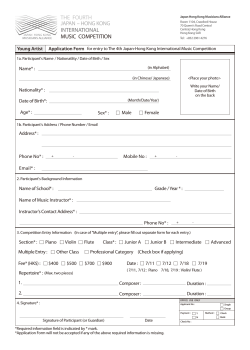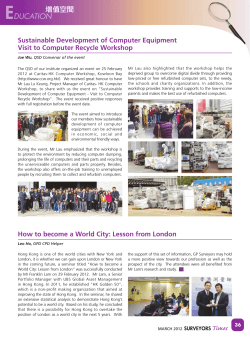
and read the Program Book
Workshop Background 30 March – 2 April 2015 Workshop 30 March, FSC 501 31 March, RRS 905 Hong Kong Baptist University Ho Sin Hang Campus, HKBU, 224 Waterloo Road, Kowloon Tong Roundtables 1-2 April 1a space Gallery, Hong Kong Organizers and Sponsors The workshop aims to critically interrogate prevailing categorizations of the history and cartography of Asia as institutionalized in Western humanities and open up alternative and new forms of knowledge and practices. A two-day workshop will gather art practitioners, critics, organizers and academics from America, Asia and Europe to present papers and art works contributing to deconstruct the normative categorization and explore different approaches to time and space in Asia. The first day will feature presentations by ten PhD candidates and artists. The second day will cover expert talks and discussions by scholars and practitioners in the art world. Schedule- Workshop Schedule Workshop 9:00 – 9:30 Coffee & Tea 11:00 – 12:00 13:30 – 14:30 Moderator: Chow Yiu Fai Moderator: Sadiah Boonstra Session 2 Alternative 9:30 – 10:00 Welcome / Introduction Philippe Peycam & Organisers 10:00 – 11:00 Session 1 Moderator: Chow Yiu Fai Everyday Yaminay Nasir Chaudhri / Cell Phone Cities: Mappinglow-res media and the politics of presentation Rune Kobayashi: The role of Art Projects for the aging society of Japan in the context of rural regeneration Discussants: Y-Dang Troeung/ Yoshitaka Mouri Day 1 // 30 March (Mon) Venue: FSC501, HKBU Christine Ithurbide / Mapping Contemporary Art Spaces in India – Integrating the Social and Spatial Dimensions of Artistic Practices in Bombay Claro Ramirez / From the Ground Up: Back to Square 1 is not Back to Zero Discussants: Edwin Jurriëns/ Chen Yun Session 3 Mobility Anneke Coppoolse / Trash, a curatorial: reimagining place in urban Hong Kong Minh Tsai / Tofu 2.0 Discussants: Viet Le / Gridthiya Gaweewong 14:30 – 15:30 Session 4 Moderator: Sadiah Boonstra Dissent Plenary Discussion Jane Jin Kaisen : Reiterations of Dissent Yu Yeuk Mui, Cally: Grey is creative, just not visible 12:30 – 13:30 Discussants: Serge-Aimé Coulibaly/ Chow Yiu Fai 12:00 - 12:30 Lunch Schedule - Workshop Day 1 // 30 March (Mon) Workshop 15:30 – 15:45 Coffee Break 15:45 – 16:45 Venue: RRS905, HKBU Dinner (upon invitation) Community Felicia Low Ee Ping: That Subaltern Stride – The practice of cultural studies and visual art with communities Marloes Van Houten et al: Cross-cultural dance collaboration and local cartographies Discussants: Zoe Butt / Jeroen de Kloet 16:45 – 17:30 Plenary Discussion & Wrap up 9:30 – 10:00 18:00 Coffee & Tea Dining place: Wong Chun Chun Thai Restaurant 10:00 – 11:00 Bus at AC Hall Session 1 Moderator: Jeroen de Kloet Session 5 Moderator: Sadiah Boonstra Day 2 // 31 March (Tue) Venue: RRS905, HKBU 21:00 Bus at Wong Chun Chun Thai Restaurant Xing Danwen / Somewhere and Nowhere - my art practice in China’s urbanization Yoshitaka Mouri / Translation, Collaboration and (Dis)communication in Contemporary Art in the Digital Era 11:00 – 12:30 Session 2 Moderator: Jeroen de Kloet Pak Sheung Chuen / My experience of making artworks in newspaper Tiffany Chung / Remapping: history and geopolitics in ruins and rubble Tessa Maria Guazon / Artist Collectives and Citizen Initiatives: New cartographies of the city and emerging modes of participation Schedule- Workshop Schedule Workshop 12:30 – 13:30 Lunch 13:30 – 14:30 Session 3 Moderator: Viet Le Edwin Jurriëns / Indonesian creative interventions: from art commune to fabrication lab Kingsley Ng / Art in contexts exhibitions beyond the gallery space 14:30-15:30 Session 4 15:30 – 15:45 Coffee Break 15:45-17:15 Session 5 Moderator: Viet Le The (Geo)Politics of Curating Claire Hsu / You can see the nice view of China from here - Notes from the ‘Asia’ Art Archive Zoe Butt / Conscious Realities Chen Yun / Working Art in Making a Social Archive: Primary Experience in Dinghai Qiao Project Gridthiya Gaweewong / Seeking the strategy to re-engage in Asia Plenary discussion Moderator: Viet Le Patrick Flores / South by Southeast Satomi Matoba / Utopia in No-Man’sLand 17:15-17:30 Wrap Up Day 2 // 31 March (Tue) Venue: RRS905, HKBU round Roundtable Backg Introduction In these two days we will focus on the fundamental concepts of time and space in the construction of knowledge of and from Asia. While area studies continues the endeavors of knowledge production, its inevitably intricate connections with national histories and geographies are increasingly foregrounded. Knowledge of Asia is still very much constructed by temporal narratives as vigorously and imaginatively as by spatial fixations: in other words, by their histories and geographies. Given that national histories are often deeply entrenched in authoritative discourses that maintain the imagined boundaries of the nationstate, and thereby erase or silence other possible histories and geographies, Prasenjit Duara’s call to rescue history – and geography, we add – from the nation remains as urgent as ever. We think of the arts, the role of artists, artist-activists and artist run spaces, as a potential rescue tool, capable of moving beyond traditional paradigms of Western scientific representation. This forum questions how artistic practices can help reimagine both time and space in the context of Asia, when put into an intimate dialogue with area studies and related methodologies and disciplines, such as anthropology, art history, cultural studies and so on. The alleged “rise of Asia” feeds into different nationalisms in the region and beyond, making such reimaginations even more urgent. Its dependency on a meta-discourse on development and modernity are resonances of concepts that are deeply entrenched in social Darwinism, making this discourse on “the rise of Asia” all the more complicated, especially in its denial of human complexity and a human craving for aesthetic and political aspirations. The roundtable aims to probe into artistic and activist practices that proffer alternate histories and “discrepant modernities” (to use anthropologist Lisa Rofel’s term), as well as processes that present different mappings of the world, the country or the city; these will be put in dialogue with area studies knowledge production that also seeks to destabilize existing cartographies and historical accounts. A transnational and diasporic remapping of Asia, in conjunction with exploring its Roundtable Background multiple histories, holds the potential to question if not undermine emerging nationalisms and prevailing reifications of the idea of “national cultures.” Main themes and organization This roundtable brings together artists, writers, curators, and scholars from a wide geographical scope to explore the issues mentioned above. Participants are invited to reflect and freely discuss the possible connections but also disjunctures between the cultural and the academic fields. In addition to sharing ideas and insights in each other’s world, the roundtable should lead to recommendations for future collaborative projects bringing artists and academia together. The roundtable is arranged in four sessions on four different topics and spread over two days. Day one will be devoted to Session 1 to 3. The first session seeks to explore the various views on the categorization of history. The second discussion focuses on remapping Asia. Session three aims to get an idea about how artists deal with reimagining urban contexts. The second day will start with a summary of the first day followed by a field trip to key cultural centers in Hong Kong. In the fourth session we will break up in smaller groups to discuss future possibilities for research and networks and collaboration. The concluding session is reserved for the participants to present the outcomes of session 4 and jointly think about specific possibilities such as a collaborative frameworks and future (research) projects in which we bring academia and artists together to rethink Asian history, cartography and politics. Session 1 // Histories This session aims at addressing the issue of time. Conventional historiography of Southeast Asia presumes a linear and univocal development from the colonial state, urbanization, modernity, and nationalism towards resistance, revolution, and the independent nation-state. This discussion builds upon the work of scholars such as Walter Benjamin, Prasenjit Duara, Michel-Rolph Truillot, Panivong Norindr, as well as artists and cultural arts activists. We are inspired by Benjamin’s assertion that history is not a whole but fragmented, and that our task may be to collect the forgotten Roundtable Background or erased fragments as to construct alternative and multiple histories that hold the power to challenge the present. We presuppose that a dialogue between art and area studies may help finding such fragments, and thereby open up an affective world, or a world of affects, as theorized by Spinoza, Deleuze, and Berlant, among others - a world that currently by and large falls outside the dominant paradigms of knowledge and representation. Session 1 thus seeks to suggest alternative approaches to teleological presumptions of historiography and standard periodization in the histories of Asia. The aim is to challenge state-centered hierarchies and include people’s experiences to explore the many faces. We furthermore seek ways in which to include voices of people and how art and artists can work towards opening up multivocal and multivalent histories. This round of discussion should contribute to enrich our narrowly defined objectivist notion of historical narrative by reconsidering lived intimate experiences, memories, traumas, fantasies, alienations, and joys—other modes of being, as Bliss Cua Lim puts it, myriad ‘immiscible temporalities.’ In his hybrid calligraphy, Xu Bing, for example, negotiates and deconstructs the alleged connection between Chinese language and culture, and thus shows us that different histories are possible. In Indonesia, Wilman Syanur retells the story of Obama in connection to the president’s youth spent in Indonesia and his subsequent forgetting or silencing, in the United States. Session 2 // Cartographies It was not until the eighteenth century that Asia ceased to represent something beyond a technical term used by cartographers. In reaction to the threat of Western colonialism, ‘Asia’ became a distinctive geopolitical space with common histories, diplomatic ties, trading links, religions, and shared futures. Session 2 aims to confront the issue of space as articulated through the construction and negotiation of boundaries, both real and fictitious, and explore the politics behind this. Maps and cartography have long been imperative to understanding how civilizations have navigated, rationalized, conquered, and shaped territories. Roundtable Background In visualizing nations and spatial limitations, maps create illusions of finitude based primarily on invented boundaries and are the result of the agenda of the map-maker and excludes everything that he wants to exclude from its boundaries. They erase movements, migrations, and the entanglements of connected histories and instead produce identities, traditions, and models of existences. we might deconstruct inherited notions of territories “by activating less visible and/or dormant sites of knowledge and offering new reference points.” How can we negotiate “between maps, borders, and systems (nation, history, politics, economy) and terrain that is often slippery and unstable (myth, histories, memory, fiction) yet vital component for considering the formation of territory?”1 Session 2 explores the way in which transnational connections, borderlands, and local structures influence the ways people experienced and shaped maps. We seek to ask what happens to the reimagination of Asia when new boundaries suddenly make themselves apparent in the world. In Japan, Satomi Matoba creates fictitious maps in which Pearl Harbour and Hiroshima are merged together, thus superimposing different localities that are connected by a troubled history. Tiffany Chung queries fact and fiction, creating palimpsest maps of still-present pasts, current developments and fantastical futures, ranging from the traumatized topographies of French Indochina to the Middle East and beyond. 1 Following Claire Hsu and Chantal Wong, we ask how Claire Hsu and Chantal Wong (Eds.), Field Notes, Issue 3: Mapping Asia, Hong Kong: Asia Art Archive. See: http://www.aaa.org.hk/FieldNotes/ Details/1210?lang=eng 2 See also http://www.ukna.asia. Session 3 // Urbanities In Asia contemporary urban realities and recent transformations are so radical that the very idea of the ‘city,’ as a recognizable spatial entity, seems to be challenged. Cities greatly expand into rural areas, turn into big agglomerations that are connected by infrastructures, and cause a drain of the rural population.2 Roundtable Background This session questions how artists, activists and scholars imagine Asia’s future in urban contexts. In which directions are representations associated to the cities, as spatial, political, and social entities, evolving? What are new meanings of the city, how are they represented in art and how do works of art imagine urban futures for Asia? For instance, Tozer Pak Sheung Chuen travels to Tokyo and chooses to be guided by the page folds, the hidden routes, of a guidebook to experience an alternative city. We also ask how vice-versa interdisciplinary modes ranging from human geography, area studies, cultural studies, heritage studies, ethnography, among others, can be reconsidered when reimagining urban and rural landscapes and mindscapes. Session 4 // Towards future directions The concluding session aims to formulate feasible outcomes, such as publications and exhibitions, as well as future research projects and network platforms in which scholars, organizers and artists can collaborate to rethink, reimagine ‘Asia.’ We ask for critical assessment of the actual and prospective roles of scholars, artists, and curators in developing alternative histories, cartographies and urbanities of Asia to create new forms of knowledge and research practices. Based on the foregoing discussions and the fieldtrip, we invite all participants to break up in smaller groups and develop future collaborative projects, research questions or ideas for network platforms and knowledge exchange. Each group will present their ideas in a closing plenary session. We will share new modes and models of collaborations and ‘artistic interventions.’ Schedule - Roundtable Day 3 // 1 April (Wed) Roundtable 10:00 Bus at NTT 11:00 – 11:15 Welcome with Coffee & Tea 11:15 - 11:30 Introduction 11:30 – 13:00 Session 1 Venue: 1a space Art Gallery 15:30 – 16:00 Break 9:00 Bus at NTT 16:00 – 17:30 Session 3 10:00-11:30 Visit I Wanna Eat Yummy Yummy (Choi Yan Chi) Oil Street Art Space Urbanities Moderator: Ho Kin Chung, Louis 17:30-18:00 Wrap up Histories Moderator: Chow Yiu Fai 13:00 – 14:00 Lunch 14:00 – 15:30 Session 2 Cartographies Moderator: Sadiah Boonstra Day 4 // 2 April (Thurs) Venue: 1a space Art Gallery Dinner (upon invitation) 19:00 Bus at Cattle Depot Dining place: Shek Kip Mei Ban Heung Lau 21:30 Bus at Ban Heung Lau 11:30-12:00 Bus at Oil Street Art Space 12:00-13:00 Lunch 13:00 – 14:30 Future Research Proposals for Artistic Interventions 14:30-15:00 Break 15:00-17:00 Session 4 Futures Moderator: Philippe Peycam / Jeroen de Kloet 17:00 – 18:00 Wrap Up rs About the Organize International Institute for Asian Studies The Andrew W. Mellon Foundation The International Institute for Asian Studies (IIAS) is a research and exchange platform based in Leiden, the Netherlands. It encourages the multidisciplinary and comparative study of Asia, and actively promotes national and international co-operation. IIAS acts as a global mediator, bringing together academic and nonacademic institutes in Asia and other parts of the world, including cultural, social and policy organisations. Without excluding other possibly interesting research areas in Asian studies, our focus is on urbanisation, heritage and globalisation. See www.iias.nl The Andrew W. Mellon Foundation (New York, US) endeavors to strengthen, promote, and, where necessary, defend the contributions of the humanities and the arts to human flourishing and to the wellbeing of diverse and democratic societies. To this end, it supports exemplary institutions of higher education and culture as they renew and provide access to an invaluable heritage of ambitious, path-breaking work. The Foundation makes grants in five core program areas: Higher Education and Scholarship in the Humanities; Arts and Cultural Heritage; Diversity; Scholarly Communications; and International Higher Education and Strategic Projects. See www.mellon.org About the Organizers Amsterdam Centre for Globalisation Studies Department of Humanities and Creative Writing, Hong Kong Baptist University The Amsterdam Centre for Globalisation Studies (ACGS) at the University of Amsterdam consists of an interdisciplinary team of researchers to generate new ways of understanding and explaining the relationship between globalisation and cultural transformation. Specific projects are developed within four interlocking research programmes addressing, respectively, issues of mobility, sustainability, aesthetics, and connectivity. These programmes have been selected to enable groundbreaking approaches to a range of pressing social concerns associated with globalisation, including issues of multiculturalism and multilingualism; ethics, politics, and nationalism; and the rise of new media and digital culture. See www.acgs.uva.nl The Department of Humanities and Creative Writing (HMW) at the Hong Kong Baptist University consists of the Humanities Programme; the Creative and Professional Writing Programme; and the Liberal and Cultural Studies Programme. Apart from training students to think critically, to sympathize with humanity and to appreciate life, HMW is dedicated to creative and professional writing and enhance the cultural literacy and cross-cultural sensibilities of students. The predecessor of HMW, the Humanities Programme, was founded in 1990 as the first and unique undergraduate programme in Hong Kong dedicated to offering a broad liberal arts education. See www.hmw.hkbu.edu.hk About the Organizers Venue Partner: 1a space 1a space, founded in 1998, is an independent, nonprofit making contemporary visual art organization and art venue founded by a collective of Hong Kong art workers. It aims to promote the critical dissemination of contemporary visual arts practices and affiliated art forms through 1a space programme drawn from Hong Kong and international arena. 1a space has played a vital role in developing new frontiers for the visual art scene in Hong Kong and abroad. One of its major achievements has been to establish contemporary visual art within a wide viewing public, making it more popular and accessible. See www.oneaspace.org.hk General Context Research, education & networking With the objective of reshaping the field of Asian Studies the three-year pilot programme (2014-2016) “Rethinking Asian Studies in a Global Context” seeks to foster new humanities-focused research. In practice, this means adapting Asian Studies to an interconnected global environment built on a network of academics and practitioners from Asia, the America’s, Europe and Africa. Educational opportunities are created by selecting cross-disciplinary methodological questions likely to shift scholarly paradigms as they pertain to Asia. Funded by the Andrew W. Mellon Foundation, the initiative is coordinated by the International Institute for Asian Studies (IIAS) in Leiden, The Netherlands, in collaboration with numerous institutions in Asia, the United States, Europe and Africa. The pilot programme includes a range of scholarly activities such as workshops, conferences and summer schools in five topical areas, or fora, that cut across regions and disciplines: 1. Artistic Interventions: Histories, Cartographies and Politics in Asia 2. Uses of Culture and Cultural Heritage 3. Asian Spatialities (the Indian Ocean World, Central Eurasia and Southeast Asian Borderlands) 4. Idea of the City in Asian Contexts 5. Views of Asia from Africa Alternative narratives Both the research orientations and the architecture of the programme seek to enable participants to think in terms of a decentered knowledge on Asia, exploring alternative narratives of Asian history, questioning conventional spatial configurations of Asia through the study of cities, exploring the complexity of the localglobal nexus, and suggesting alternative approaches from those developed in Western – or Asian – academia. Find more information on: http://rethinking.asia Research strategy The programme is incorporated in the overall research General Context strategy of the IIAS, which focuses on three thematic clusters, namely Asian Cities, Asian Heritages and Global Asia. The workshops and roundtables events are part of the research network Rethinking Asian Studies, find more information on: Website http://rethinking.asia Facebook Rethinking Asian Studies Forum 1: Artistic Interventions Contact List Sadiah BOONSTRA International Institute for Asian Studies sadiahboonstra@gmail.com Yiu Fai CHOW Hong Kong Baptist University yfchow@hkbu.edu.hk Zoe BUTT San Art zoe@san-art.org / zoembutt@gmail.com Tiffany CHUNG Artist tiffanytchung@gmail.com Yaminay Nasir CHAUDHRI Tentative Collective yaminay@gmail.com Anneke COPPOOLSE Lingnan University of Hong Kong annekecoppoolse@gmail.com CHEN Yun West Heavens chenyun_fd@hotmail.com Serge-Aimé COULIBALY Faso Danse Theatre sergeaime1@gmail.com CHOI Yan Chi Artist, Curator 1a space Gallery chenyun_fd@hotmail.com Patrick FLORES University of the Philippines patrickdflores@yahoo.com Contact List Gridthiya GAWEEWONG Project 304; the Jim Thompson Art Center project304@gmail.com Tessa Maria GUAZON University of the Philippines tessaguazon@gmail.com Christine ITHURBIDE Paris Diderot University c.ithurbide@orange.fr Edwin JURRIËNS The University of Melbourne edwin.jurriens@unimelb.edu.au Louis HO Kin Chung Hong Kong Baptist University louisho@hkbu.edu.hk Jane Jin KAISEN The Royal Danish Academy of Fine Arts / University of Copenhagen janejinkaisen@gmail.com Marloes van HOUTEN Lingnan University of Hong Kong mrls.vanhouten@gmail.com Jeroen de KLOET University of Amsterdam b.j.dekloet@uva.nl Claire HSU The Asia Art Archive claire@aaa.org.hk Viet LE The California College of the Arts vietle@mindspring.com Contact List Felicia LOW Ee Ping National University of Singapore felicia@ccd.sg Kingsley NG Hong Kong Baptist University kingsleyng@hotmail.com Titia van der MAAS International Institute of Asian Studies t.van.der.maas@iias.nl PAK Sheung-Chuen Artist tozerpak@gmail.com Anson MAK Hoi Shan Hong Kong Baptist University ansonmak@hkbu.edu.hk / aahsun@gmail.com Philippe PEYCAM International Institute of Asian Studies p.m.f.peycam@iias.nl Eva MAN Kit Wah Hong Kong Baptist University evaman@hkbu.edu.hk Satomi MATOBA Hijiyama University satomi_matoba@hotmail.com Kalpana RAGHURAMAN Artist, Cultural Anthropologist kalpanarts@gmail.com Claro RAMIREZ Back to Square Juan claro.ramirez.jr@gmail.com Contact List RUNE Kobayashi Kobe University runekobayashi@yahoo.com Priya SRINIVASAN University of California Riverside priya66@yahoo.com Y-Dang TROEUNG City University of Hong Kong ytroeung@cityu.edu.hk XING Danwen Danwen Studio danwenstudio@gmail.com / info@danwen.com YOSHITAKA Mouri Tokyo National University of Fine Arts and Music yoshimouri@hotmail.com Cally YU Yeuk Mui Grey and Green Ping Pong green7086@gmail.com Credits Organizers Organizing Committee International Institute for Asian Studies Andrew W. Mellon Foundation Amsterdam Centre for Globalisation Studies Department of Humanities and Creative Writing, Hong Kong Baptist University Dr. Sadiah Boonstra IInternational Institute for Asian Studies, Leiden University Dr. Chow Yiu Fai Department of Humanities and Creative Writing, Hong Kong Baptist University Prof. Jeroen de Kloet Amsterdam Centre for Globalisation Studies, University of Amsterdam Dr. Việt Lê Visual Studies Program Visual + Critical Studies Graduate Program, California Program Coordinator Titia van der Maas International Institute for Asian Studies, Leiden University Venue Partner 1a Space Useful Contacts Event Coordinators Yvette Wong Miyan Cheung Man Yan Dickson Lam Tik Son Yvette Wong Lok Yee +852 63739422 Designer +852 67069680 Sui Lam sui@9und5zig.com NTT International House Poster Image Tiffany Chung 10.7747ºN 106.6667ºE, 2007 oil and alcohol-based marker on paper 79 x 109 cm Image courtesy the artist and Galerie Quynh Dickson Lam +852 2301 2301
© Copyright 2025
